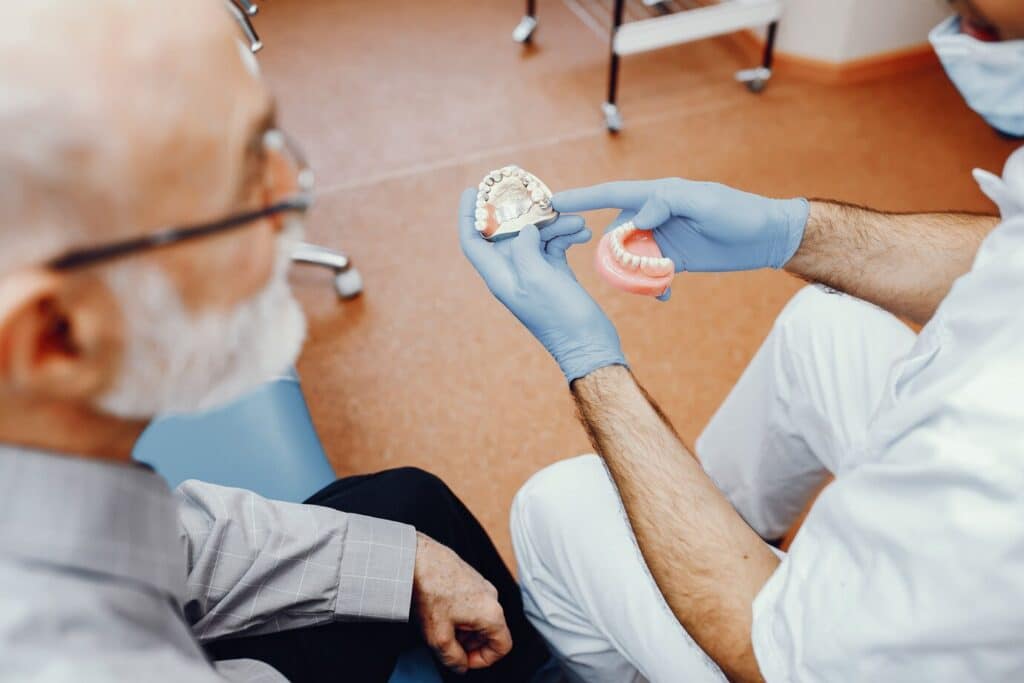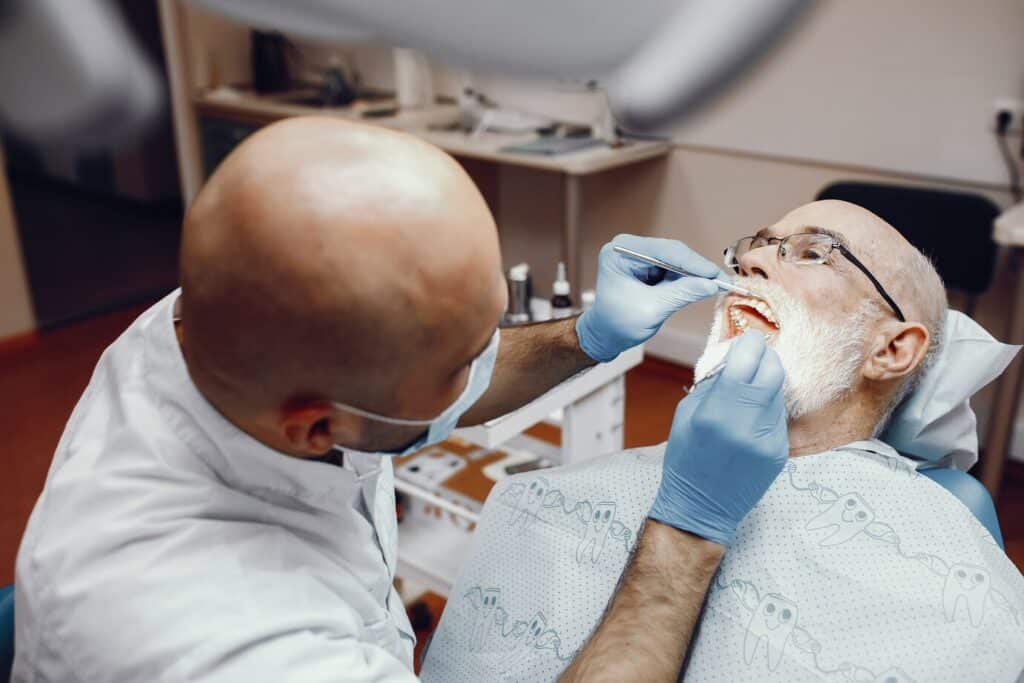As you age, your oral health becomes increasingly important. You’ve worked hard to enjoy your golden years, and maintaining good oral health is crucial to savoring the flavors and textures of your favorite foods. At Lakeview Senior Living in Lincoln City, OR, we understand seniors’ unique challenges regarding oral health. From dental decay and periodontal disease to tooth loss and ill-fitting dentures, we’re here to guide you through the common oral health issues that can affect your quality of life. By understanding these issues and taking proactive steps to prevent them, you can enjoy a healthier, happier smile for years.
Common Oral Health Issues in Seniors
Your golden years should be filled with joy, comfort, and good health. However, your oral health may decline as you age, leading to various issues affecting your overall well-being. Understanding these common oral health issues is crucial in preventing and addressing them effectively.
Dental Decay
Dental decay is common for seniors, leading to cavities and tooth loss. As you age, your dexterity may decline, making it harder to clean your teeth effectively, especially in the back. Additionally, certain medications can reduce saliva production, allowing bacteria and plaque to build up and attack your tooth structure.
Periodontal Disease
Your risk of developing periodontal disease increases with age. This condition occurs when bacteria and plaque build up in your mouth, infecting your gums and bone. If left untreated, it can lead to severe bone and tooth loss.
Recognizing the signs of periodontal disease, such as red, swollen, receding, or bleeding gums, is crucial. If you notice any of these symptoms, consult your dentist immediately. Periodontal disease can be treated, but prevention is key. Regular dental check-ups, good oral hygiene, and a healthy diet can help prevent this condition.
What Level of Care Do You Need?
Discover the level of care you or your family member requires.
Tooth-Related Problems
Seniors may encounter a range of tooth-related problems, including tooth loss, cracked or broken teeth, and tooth wear. According to The Senior’s Guide to Dental Care—Harvard Health, these issues can significantly impact daily life, making eating, speaking, and socializing difficult. As you age, you must be aware of these potential problems and take steps to prevent or address them.
Tooth Loss
Any senior who has experienced tooth loss knows how it can affect their confidence and overall quality of life. Tooth loss can occur for various reasons, including decay, gum disease, or physical injury. Left untreated, it can lead to further complications, such as shifting teeth, bite problems, and facial sagging.
Cracked or Broken Teeth
Tooth cracks or breaks can be painful and potentially lead to infection or tooth loss if left untreated. Seniors are more prone to cracked or broken teeth due to weakened tooth structure, which can be caused by years of wear and tear, acid erosion, or physical trauma.
It’s crucial to seek professional dental care to address cracked or broken teeth. Depending on the severity of the crack or break, your dentist may recommend a root canal, crown, or extraction. By addressing these issues promptly, you can prevent further complications and maintain good oral health.
Denture-Related Issues
There’s no denying that dentures can be a game-changer for seniors who have lost teeth. However, ill-fitting dentures can lead to many problems affecting your oral health and quality of life. As you age, your facial structure and muscles change, which can cause dentures to shift and become uncomfortable. If you’re experiencing issues with your dentures, it’s imperative to consult with a dentist to ensure a proper fit. For more information on maintaining healthy teeth and gums, check out our article on Dental Care Tips for Seniors to Maintain Healthy Teeth and Gums.

Denture-Related Issues
Ill-Fitting Dentures
One of the most common issues with dentures is that they can be ill-fitting, causing discomfort and pain. Dentures can rub against the mouth’s soft tissues when they don’t fit properly, leading to painful ulcers and infections. If you’re experiencing discomfort or pain with your dentures, it’s crucial to consult with a dentist to get them refitted.
Tooth Wear
In addition to dealing with dentures, seniors may experience tooth wear due to years of chewing, grinding, and eating acidic foods. This can lead to increased tooth sensitivity and pain.
This wear and tear on tooth enamel can be exacerbated by gastric issues such as gastric reflux, where stomach acid enters the mouth and erodes tooth enamel further. As a result, it’s imperative to take steps to protect your teeth and gums from acid erosion. Practicing good oral hygiene habits and visiting your dentist regularly can help prevent tooth wear and maintain a healthy, pain-free smile.
Nutrition and Diet for Healthy Teeth
Many seniors struggle with maintaining good oral health due to various factors, including diet. A healthy diet rich in necessary nutrients is crucial for maintaining strong teeth and gums. A well-balanced diet provides the building blocks for healthy teeth. In contrast, a diet lacking the essential nutrients can lead to oral health issues.
The Importance of a Balanced Diet
Harmonious nutrition is vital for maintaining healthy teeth and gums. A balanced diet that includes a variety of fruits, vegetables, whole grains, and lean proteins provides the necessary nutrients for healthy tooth development and maintenance. A diet rich in calcium, vitamin D, and other essential minerals helps to strengthen teeth and bones, reducing the risk of oral health issues.

The Importance of a Balanced Diet
Foods to Avoid for Healthy Teeth
One of the most critical aspects of maintaining good oral health is avoiding foods that can harm your teeth. Sugary and acidic foods and drinks can contribute to tooth decay, erosion, and other oral health issues. Limiting or avoiding foods and beverages high in sugar, acid, and salt can help prevent oral health problems.
Understanding certain foods’ impact on oral health is crucial for making informed dietary choices. Foods high in sugar, such as candy, cookies, and sweetened beverages, can contribute to tooth decay and erosion. Acidic foods and drinks, like citrus fruits and soda, can erode tooth enamel, making teeth more susceptible to decay. Additionally, foods high in salt can contribute to dry mouth, increasing the risk of oral health issues. By being mindful of your diet and avoiding foods that can harm your teeth, you can help to maintain good oral health.
Let me know if this meets your requirements! Here is the content for the chapter “Caring for Your Senior’s Oral Health” and its subsections:
Compare The Costs of Senior Living vs Staying at Home
How Do The Costs Of Moving Into A Quality Senior Care Community Compare With The Costs Of Staying At Home?
Caring for Your Senior’s Oral Health
Once again, as a caregiver, you play a vital role in ensuring your senior’s oral health is well-maintained. By being aware of the common oral health issues that affect seniors and taking proactive steps to prevent them, you can help your loved one enjoy a better quality of life.
What to Look Out for?
Caring for your senior’s oral health requires vigilance. Look for signs of oral health issues, such as chewing only one side of the mouth, suddenly refusing food, persistent bad breath, bright red and bleeding gums, exceptionally long teeth, broken teeth, shaky or lost teeth, and white spots or ulcers that don’t go away.
Creating a Daily Oral Care Routine
A daily oral care routine is vital for your senior’s oral health. This includes brushing their teeth at least twice daily with fluoride toothpaste, flossing once daily, and rinsing with an antibacterial mouthwash.
Seniors may need assistance with their daily oral care routine, especially if they have difficulty moving around or have cognitive impairments. As a caregiver, you can help by providing them with easy-to-use oral care tools, such as floss picks and flexible soft-bristle brushes. You can also encourage them to visit their dentist regularly for check-ups and cleanings.
Regular Check-Ups and Professional Care
Regular dental check-ups are essential to maintaining good oral health. Our oral health needs change as we age; regular check-ups can help identify potential issues before they become severe. According to Dental Care for Seniors: Common Issues and Tips, regular dental visits can help prevent oral health problems and promptly address any issues.
The Role of Regular Dental Check-Ups
Regular dental check-ups are an essential aspect of maintaining good oral health. These check-ups allow your dentist to monitor your oral health, identify potential issues, and provide personalized advice on maintaining good oral hygiene.

Regular Dental Check-Ups
Professional Cleaning and Other Treatments
One of the most critical aspects of professional care is regular cleaning. Professional cleaning can help remove plaque and tartar build-up, reducing the risk of gum disease and tooth decay.
Professional cleaning and other treatments, such as fluoride applications and dental sealants, can help prevent oral health issues. Additionally, your dentist may recommend other treatments, such as dental crowns or bridges, to restore damaged teeth. By investing in professional care, you can ensure that your teeth and gums remain healthy, allowing you to enjoy a better quality of life.
Find Where You Belong
Dive into the vibrant life our Westmont communities have to offer.
Conclusion
Following this guide, you are now equipped with the knowledge to understand and prevent common oral health issues affecting seniors. By recognizing the signs and symptoms of dental decay, periodontal disease, tooth loss, ill-fitting dentures, tooth wear, and cracked or broken teeth, you can take proactive steps to maintain your loved one’s oral health. Remember to schedule regular dental check-ups, introduce easy-to-use teeth cleaning tools, and communicate the importance of oral health to your senior. By doing so, you can help them enjoy their golden years with a healthy, pain-free smile. Contact Lakeview Senior Living at 541-994-7400 to learn more about our senior living services in Lincoln City, OR.








